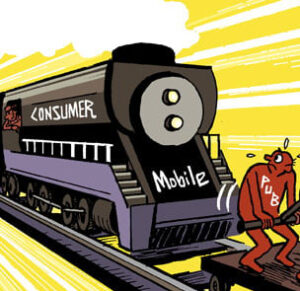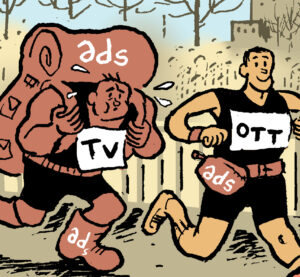No More Rose-Tinted Glasses
Cindy Rose joined WPP earlier this year with a turnaround plan for the world’s one-time biggest ad buyer and agency holdco.
Easier said than done.
WPP’s like-for-like revenue less pass-through costs in Q3 (which Digiday describes as “roughly equivalent to net revenue”) was down by 5.9% from last year, with the company now expecting a 6% decline by year end.
The largest client losses have been within WPP Media, which Rose emphasized must be turned around and revamped – likely with the adoption of an “open, privacy-first data and AI powered ecosystem.”
Many WPP clients find the company’s offerings “very complicated” and are looking for a simpler user experience, Rose told investors during the earnings report.
What does a solution look like?
“We need to be a little less holdco and a little more co,” she said. This means more integration throughout the firm and more agency consolidation, as WPP focuses on simpler enterprise and tech solutions.
“Our recent performance,” Rose said bluntly, “is unacceptable.”
The Carriage Trade
Broadcast giants like Comcast, Charter and NBCU are accustomed to haggling over carriage and distribution deals. But Google throwing its weight around is a whole new experience.
This time, YouTube TV is coming up against the king of the castle. YouTube TV’s distribution dispute with Disney expired at midnight last night. (By the time you’re reading this, a middle-of-the-night deal to avert channels going black will probably have been reached.)
YouTube TV has been frustrating big broadcasters – NBCU and Fox begrudgingly signed recent deals – by demanding terms that are “out of step with the marketplace,” as Fox put it during its contract renewal dispute in August.
A few years ago, Roku complained that YouTube demanded preferential search treatment and built-in features for voice interactions and data collection that no other company insisted upon.
When it comes to the web, Google doesn’t negotiate. So perhaps TV companies should consider themselves lucky.
“I don’t blame YouTube TV for trying this,” MoffettNathanson analyst Michael Nathanson tells The Wall Street Journal. “They will be the biggest in town and have the best tech.”
Barely Out Of The Blox
Eager for an update about Roblox’s nascent ad business?
Keep waiting.
Back in May 2024, Roblox CEO David Baszucki said he expected advertising to be “a nice increment to the business” in 2025, but not a material revenue contributor until 2026 or even 2027.
So it’s no big surprise that Baszucki didn’t mention advertising in his prepared remarks during Roblox’s Q3 earnings call on Thursday. However, his shareholder letter noted that more than 140 Roblox creators have now integrated rewarded video ads into their games.
Still, an investor on the call asked for more color on advertising growth prospects – especially since Q3 was the first full quarter since Roblox started making its rewarded video ads available through Google Ad Manager in June.
Baszucki declined to speculate on ad impact. In fact, Roblox did not offer revenue projections for 2026 at all, which may have contributed to a 15% dip in the company’s stock price on Thursday.
But Baszucki hinted that the company isn’t rushing rewarded video adoption. “We want to be very thoughtful and diligent with those creators about how we integrate rewarded video,” he said, “[and] that it works for our users in terms of the experience, performance, etc.”
But Wait! There’s More!
How agencies, publishers and platforms are putting AI agents to use today. [Digiday]
Internet pioneer AOL to be acquired by Italian tech holding company Bending Spoons. [WSJ]
Fox Corporation reports a 6% YOY increase in ad revenue, with cable ad revenue up 7% and Fox-owned Tubi posting a 27% growth rate. [Yahoo Finance]
On top of everything else, retailers are losing out on millions of dollars because the US government stopped minting pennies earlier this year. [Fortune]
Figma acquires Weavy, an AI-based video- and image-generation company. [TechCrunch]
Universal Music Group and AI song-generation platform Udio have settled a copyright infringement lawsuit and agreed to team up on a new music creation platform. [AP]
You’re Hired!
Operative appoints Michael Napodano as CEO. [release]
Snap adds two new faces to its North American sales team: Lena Terpanjian as director of US agency development [LinkedIn] and Rick Krugh as senior director of food and essentials. [LinkedIn]
Thanks for reading AdExchanger’s Daily News Roundup. Want it by email? Sign up here.

















